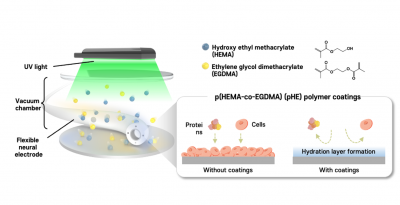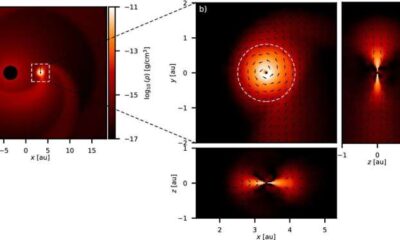Science
Innovative Coating Boosts Lifespan of Brain Electrodes to Over 3 Months

A team of researchers in South Korea has made significant strides in the field of neural engineering. Led by Dr. Hyejeong Seong at the Korea Institute of Science and Technology (KIST), in collaboration with Prof. Seongjun Park from Seoul National University, the team has developed a new coating technology that dramatically extends the lifespan of implanted brain electrodes. This innovation allows these electrodes to function effectively for over three months, a notable increase from the previous lifespan of just one month.
The breakthrough stems from a joint effort between KIST, under the leadership of President Sang-Rok Oh, and Seoul National University, led by President Hong-Lim Ryu. The research team has focused on enhancing the durability of brain signal recording devices, which are critical for various neuroengineering applications, including brain-computer interfaces and neuroprosthetics.
Enhancing Neural Interfaces
This new coating technology addresses a significant limitation in the field of neural interfaces. Traditionally, implanted electrodes experience degradation over time, leading to a decline in their performance and reliability. The innovative coating developed by the team not only protects the electrodes but also maintains their functionality for a longer duration.
The implications of this advancement are vast. A longer-lasting electrode can provide more consistent data collection, which is essential for both research and clinical applications. The ability to record brain signals over an extended period can enhance the understanding of brain functions and improve therapies for neurological disorders.
Future Applications and Research Potential
As the research progresses, potential applications of this technology could revolutionize treatments for conditions such as epilepsy, Parkinson’s disease, and even severe depression. By providing a stable connection to the brain, these electrodes can contribute to more effective monitoring and treatment options, ultimately improving patient outcomes.
While the team has achieved a significant milestone, ongoing research will be necessary to refine the technology further and explore its full potential in various medical fields. The findings are expected to be published in an upcoming edition of a peer-reviewed journal, providing greater visibility to this promising development.
In conclusion, the collaborative efforts between KIST and Seoul National University represent a pivotal moment in the field of neural engineering. As researchers continue to innovate and overcome existing challenges, the future of brain-computer interfaces and other neurotechnologies looks increasingly promising.
-

 Science2 months ago
Science2 months agoOhio State Study Uncovers Brain Connectivity and Function Links
-

 Politics2 months ago
Politics2 months agoHamas Chief Stresses Disarmament Tied to Occupation’s End
-

 Science1 month ago
Science1 month agoUniversity of Hawaiʻi Joins $25.6M AI Project for Disaster Monitoring
-

 Entertainment2 months ago
Entertainment2 months agoMegan Thee Stallion Exposes Alleged Online Attack by Bots
-

 Science4 weeks ago
Science4 weeks agoALMA Discovers Companion Orbiting Giant Star π 1 Gruis
-

 Science2 months ago
Science2 months agoResearchers Challenge 200-Year-Old Physics Principle with Atomic Engines
-

 Entertainment1 month ago
Entertainment1 month agoPaloma Elsesser Shines at LA Event with Iconic Slicked-Back Bun
-

 World1 month ago
World1 month agoFDA Unveils Plan to Cut Drug Prices and Boost Biosimilars
-

 Business1 month ago
Business1 month agoMotley Fool Wealth Management Reduces Medtronic Holdings by 14.7%
-

 Top Stories2 months ago
Top Stories2 months agoFederal Agents Detain Driver in Addison; Protests Erupt Immediately
-

 Entertainment1 month ago
Entertainment1 month agoBeloved Artist and Community Leader Gloria Rosencrants Passes Away
-

 Science2 months ago
Science2 months agoInnovator Captures Light at 2 Billion Frames Per Second







